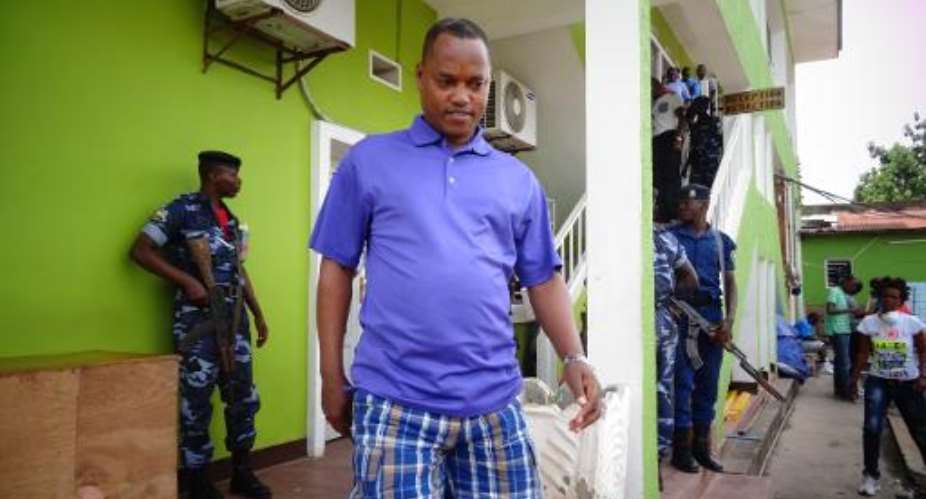Bujumbura (Burundi) (AFP) - Burundi's government insisted Friday that the first stage of controversial elections will go ahead next week despite the central African nation's ongoing political crisis.
Interior Minister Edouard Nduwimana said that despite the withdrawal of support from the influential Catholic Church and the European Union, parliamentary polls will take place next Friday in "good conditions".
"There isn't any electoral process that doesn't suffer from problems, in Burundi or any other country. We regret that certain partners have pulled out of the process... but despite this the elections will go ahead in good condition," he told AFP.
"That the EU withdraws and that the Church withdraws its priests does not mean the elections should not take place. The Burundian people are thirsty for these elections and we need to do everything so they take place in good conditions," he added.
Burundi's crisis surrounds President Pierre Nkurunziza's bid for a third term in office, with opposition and rights groups saying the move violates the constitution as well as the terms of a peace deal that ended a 13-year civil war in 2006.
Burundi's capital has been hit by weeks of civil unrest which has left at least 30 dead in a major security crackdown, and the crisis intensified earlier this month when a top general staged a failed coup attempt -- increasing fears that the impoverished, landlocked country could be plunged back into widespread violence.
Parliamentary elections are due to be held on June 5, with a presidential poll scheduled for June 26.
On Thursday, however, Burundi's Catholic Church said it could not support the polls, and asked priests who serve in electoral commissions across the central African nation to step down.
The opposition has also said the holding of free and fair elections is impossible, with independent media silenced and allegations of widespread threats and intimidation by Nkurunziza's supporters.
- Weekend summit planned -
Demonstrations against Nkurunziza meanwhile continued on Friday, after a night punctuated by bursts of shooting, witnesses said.
In the city's protest hotspots of Musaga, Cibitoke and Nyakabiga, as well as in the Bwiza neighbourhood, police chased away protestors who had sought to build barricades overnight and on Friday police were again deployed in large numbers in those areas.
Police patrolling in all three of the neighbourhoods where protests have been the strongest fired warning shots in the air, or aimed at suspected demonstrators to break up crowds or prevent them from forming.
Regional heads of state are due to meet again on Sunday in Dar es Salaam to discuss Burundi's crisis but it is unclear whether Nkurunziza will attend.
The last time the president left the country, for the previous regional summit on May 13, some members of the armed forces tried to overthrow him, launching an ultimately unsuccessful coup attempt.
On Friday neighbouring Tanzania, which has been openly critical of Nkurunziza, also called on Burundi's government to "listen" to its people.
"Our position is that we call on the Burundian people to remain calm and we urged the government to listen to them," Tanzania's foreign minister, Bernard Membe, told state-run TBC1 television.
United Nations special envoy Said Djinnit meanwhile said talks between the government and opposition had made progress on several issues -- including the reopening of independent media and the release of detainees -- but not on the key issue of a halt to protests in return for Nkurunziza's agreement not to stand again.
He said both sides "have agreed to resume their talks after the summit in Dar es Salaam."





 Former Kotoko Player George Asare elected SRC President at PUG Law Faculty
Former Kotoko Player George Asare elected SRC President at PUG Law Faculty
 2024 elections: Consider ‘dumsor’ when casting your votes; NPP deserves less — P...
2024 elections: Consider ‘dumsor’ when casting your votes; NPP deserves less — P...
 You have no grounds to call Mahama incompetent; you’ve failed — Prof. Marfo blas...
You have no grounds to call Mahama incompetent; you’ve failed — Prof. Marfo blas...
 2024 elections: NPP creates better policies for people like us; we’ll vote for B...
2024 elections: NPP creates better policies for people like us; we’ll vote for B...
 Don’t exchange your life for wealth; a sparkle of fire can be your end — Gender ...
Don’t exchange your life for wealth; a sparkle of fire can be your end — Gender ...
 Ghana’s newly installed Poland train reportedly involved in accident while on a ...
Ghana’s newly installed Poland train reportedly involved in accident while on a ...
 Chieftaincy disputes: Government imposes 4pm to 7am curfew on Sampa township
Chieftaincy disputes: Government imposes 4pm to 7am curfew on Sampa township
 Franklin Cudjoe fumes at unaccountable wasteful executive living large at the ex...
Franklin Cudjoe fumes at unaccountable wasteful executive living large at the ex...
 I'll 'stoop too low' for votes; I'm never moved by your propaganda — Oquaye Jnr ...
I'll 'stoop too low' for votes; I'm never moved by your propaganda — Oquaye Jnr ...
 Kumasi Thermal Plant commissioning: I pray God opens the eyes of leaders who don...
Kumasi Thermal Plant commissioning: I pray God opens the eyes of leaders who don...
